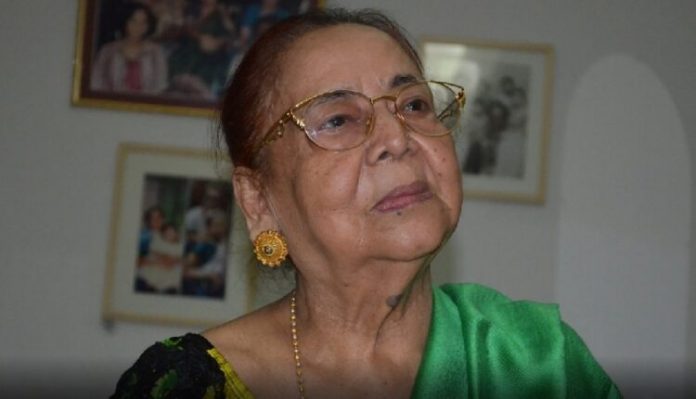Shining Star in contemporary Bengali literature.Sardar Fazlul Karim, an epistemologist, said about death: ‘The day of death of a person is his real birthday. So the birthdays we celebrate, some in their fifties, some in their forties or sixties – are not very accurate. Because even then the whole portrait is not in front of us. Even then the circuit was not complete. Indeed, the lifespan of a human being can be fully traced only after his death. The biography of Rabeya Khatun, a well-known multi-dimensional writer of Bangladeshi literature, which started on December 26, 1935, was completed on January 3, 2021. She was born during the British rule at her uncle’s house in Bikrampur, then Dhaka district. Her ancestral home is in Srinagar police station. Father Maulvi Mohammad Mulluk Chand, mother Hamida Khatun. Her father was in government service and her grandfather was a hobby poet.
She spent her childhood and adolescence in a rented house in the alleys of Raysaheb Bazar in old Dhaka during the British rule. Rabeya Khatun has lived a colorful and long life. For more than seven decades, she has written literature in concentrated pursuit. Very few Bengali language writers have had the opportunity to write literature for such a long time. Novels, short stories, memoirs, travelogues – all these are her great works.
Rabeya Khatun is one of the pioneers of the ‘new literature’ movement in post-Kallol-post-East Bengal. She made her debut as a writer in the 1950s, when the lives of Muslim women in East Pakistan were marred by many restrictions. Being the daughter of a conservative Muslim family, she was not allowed to go to college after school. After passing SSC, she did not do any formal education as she was not interested in it. Rabeya Khatun has had to overcome many obstacles to write since her childhood. 1947-49. Two or four stories have already been published in newspapers. In the eyes of teenage Rabeya, the dream was to become a writer.
When the dream is about to come true, a letter comes in a hurry from Rabeya Khatun’s elder sister’s father-in-law’s house. The letter read, “The handwritten newspaper of Rabu is seen by the men of the office, for which I have to be reprimanded.” At that time, despite the objections of her parents, Rabu kept herself engaged in the pursuit of creativity. In the course of time, the teenage Rabu of that day became Rabeya Khatun, a well-known multi-dimensional writer of Bangla literature. Honored with the state’s highest honor, the Freedom Award.
Rabeya Khatun was married to ATM Fazlul Haque, editor and film director, on July 23, 1952. Instead of following the traditional path, he chose the work of cinema magazine and fiction at that time. However, in adulthood, she kept herself confined in a ring. To many she was a distant writer. Many of this generation were familiar with her writing or name but were not in touch. The first meeting with the delightful writer Rabeya Khatun took place in July 2012. Her residence in Gulshan is in the ‘corner of the house’. Talks were held with her for a publication called ‘Artificial’. At that time, I learned in conversation, various aspects of life and literature. It is unthinkable to see a humble, sharp personality, low voice, slow steps, full smiling face, behind this personality is an impossibly powerful writer in Bengali language.
Of particular note are Rabeya Khatun’s struggle with literature and her struggle for survival in general in the context of the beleaguered Bengali Muslim society of the 1950s. The dreaminess in which she started her life was not uninterrupted. As a young woman, she went on the longest journey of her life with her four children. That path was not smooth. In addition to writing, she has taught. She was involved in many other things. She was a council member of Bangla Academy. Member of the Constitutional Steering Council of the National Library, Judge of the Jury Board of the National Film Awards, Member of the Council of the Children’s Academy.
Rabeya Khatun’s writing is handcuffed with novels. The subject matter of her writing was as varied as her life experience. Contemporary politics, liberation war, language movement, history of the masses, development of the middle class, settlements, life of artificial citizens parallel to the natural rural life, patriotism etc. were the subjects of her fiction. Madhumati – The first published novel is about the tragedy of the lives of the people of the weaving community. Later, a film was made based on ‘Madhumati’. Other films were made – ‘Glass Walls’, ‘Sometimes Clouds Sometimes Rain’, popular liberation war based novel ‘Cloud after Cloud’.
Over seven long decades, 400 stories, 50 novels, and more than 20 travelogues were published. Children’s literature and other writings worth mentioning. Traveling the country was one of Rabeya Khatun’s addictions. She has toured different countries of the world with intense investigative vision. Travel not only lived well, loved to express her joy and appreciation in words. She has broken the traditional table of writing travel stories in Bengali language. Her immortal writings on the war of liberation, diary of the blockade of nine months – ‘Nine months of 1971’, ‘Slaughterhouse’. Not only the war of liberation, but also the background of the language movement he wrote Ferrari Surya, Ghatak Ratri, Hiran Dah, the name of the garden is Malnichhara and Hanif’s horse. Her writings have been translated into many languages of the world. She will survive as a shining star in contemporary Bengali literature. Humble respect to her.
Written by: Marzia Lipi
Researcher and environmentalist





